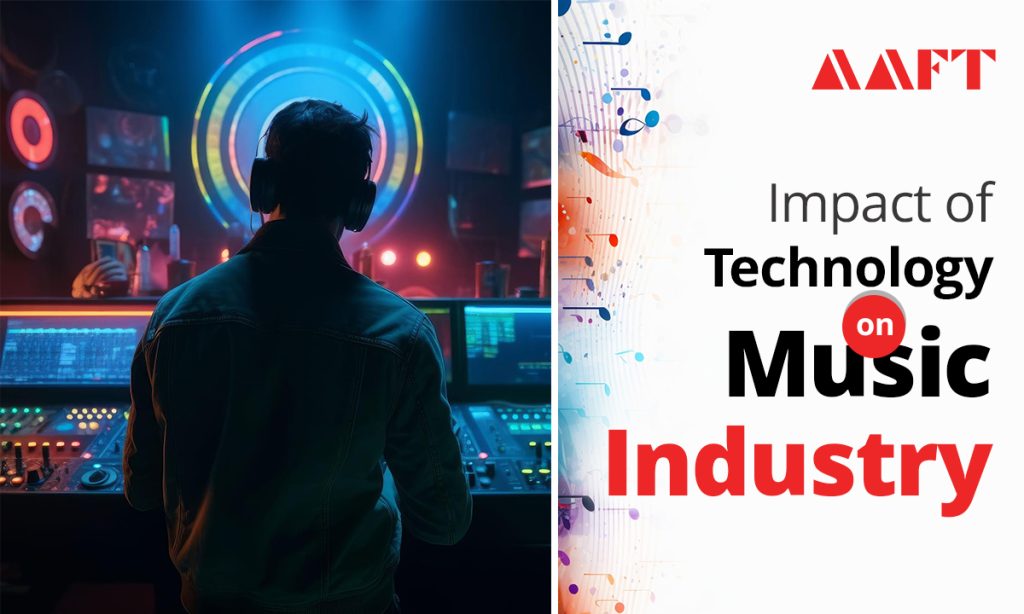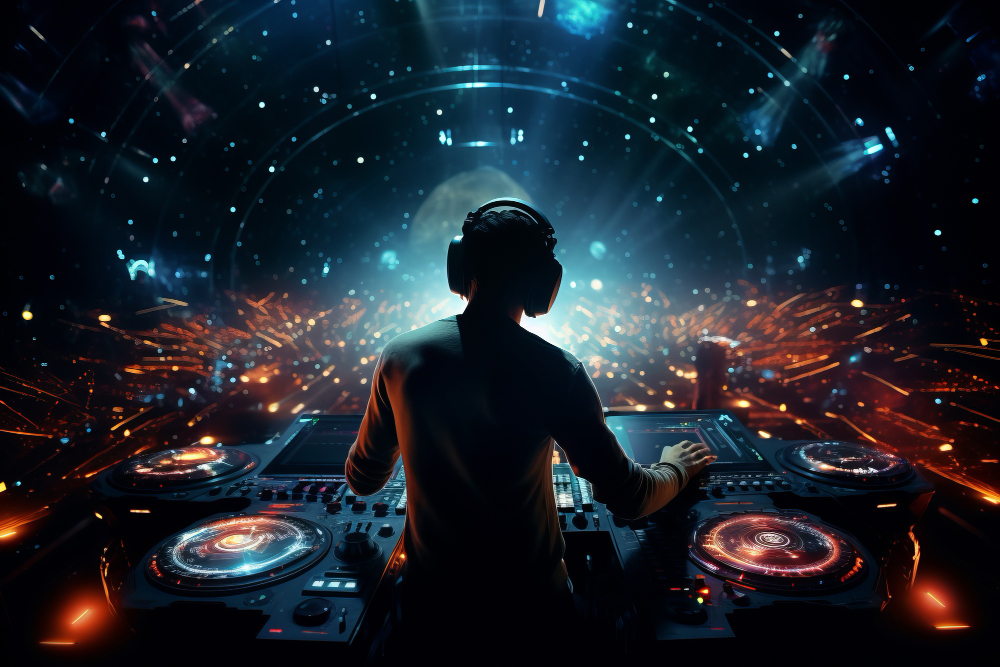The Impact of Technology on the Music Industry
Within a time period characterized by perpetual advancement, the music industry serves as evidence of the revolutionary potential of technology. This succinct analysis explores the ways that technology has transformed the production, use, and sharing of music while providing an early look at the trends that will shape the future development of the sector.
In the music industry, technology has had a revolutionary effect. It has fundamentally changed the nature of the music industry by revolutionizing the production, consumption, and dissemination of music.
Future trends point to more innovative music production, the emergence of AI-generated music, and more immersive listening experiences for users of augmented and virtual reality technologies. The ways in which we engage and perceive music will continue to be shaped by technology.
The Impact of Technology on Music Creation Technology
Technology has a greater influence on music production than just making it more accessible and affordable. It has ushered in a new era of possibility and invention for musicians, and it has radically impacted the way they create.
AAWs, or digital audio workstations, have made producing music more accessible. With their help, musicians may easily compose, record, arrange, and edit their music in a virtual studio setting. With the abundance of virtual instruments, effects, and mixing capabilities available in DAWs, musicians may now experiment with sound and explore a wide range of genres.
Read Also: A Guide for Students Considering a Career in Music
Previously large, costly hardware, synths are now available as software plugins. With a few mouse clicks, musicians may create complex electronic sounds, simulate vintage analog synths, or create whole new aural worlds. Through sample-based production, samplers allow artists to work with and reinterpret pre-existing audio, stimulating creativity.
With time, sequencers have developed into extremely useful instruments for orchestration and arrangement creation. They make it easier for musicians to precisely manage musical aspects like rhythms and melodies, allowing them to breathe life into sophisticated works.
What’s more, technology has made cross-border cooperation possible. Artists can work together synchronously or asynchronously, sharing music and ideas via the Internet. Due to this interconnection, there is now more opportunity to experiment with different genres and combine different musical influences.
In conclusion, the way that technology affects music production has fundamentally changed the creative process. It has made music production more accessible and democratic by removing obstacles to entrance and creating new platforms for artistic expression. With an unparalleled arsenal at their disposal, musicians may now experiment, develop, and rethink the limits of music.
Read Also: How to Choose the Right Music Course: Step-by-Step Guide
The Impact of Technology on Music Consumption
Technology has completely changed how people listen to music, leading to a significant transition from CDs to digital platforms. Along with completely changing the music industry, these changes have brought forth a number of benefits for both fans and musicians:
- Ease and Availability: Thanks to digital consumption, music is now always on hand. Large song catalogs that are instantaneously playable are available on streaming platforms like YouTube, Apple Music, and Spotify. Listeners can now easily discover new artists and explore a wide range of genres..
- Expanded Audience: Nowadays, musicians don’t only rely on conventional record labels to release their work. Independent artists are able to disseminate and market their work worldwide through digital media. The distribution environment has become more inclusive and diverse as a result of this democratization of music.
- Prospects for Teamwork: The advent of digital platforms has enabled musicians from all regions of the world to work together. It’s simple for artists to share their creations on the internet, allowing for remote collaboration. This has brought cultural fusion and cross-genre innovation to the music industry, enriching it.
- Music Discovery: On streaming services, algorithms, and customized playlists assist consumers in finding music that suits their tastes. This increases the visibility of both well-known and up-and-coming performers, giving musicians additional chances to engage with their listeners.
- Money Streams and Monetization: Although piracy is still a problem, digital platforms provide musicians with a number of money sources, such as product sales, digital downloads, and streaming royalties. Artists are able to support their professions more successfully with this varied revenue approach.
- Real-time Analytics: Musicians have access to data and analytics about the performance of their work in real-time. They may make data-driven decisions, improve their marketing strategy, and gain a deeper understanding of their audience with the use of this information.
- Ability to Quickly Adjust: Musicians possess the ability to promptly adjust to changing trends in music consumption technology. For instance, the popularity of short-form videos on websites like TikTok has opened up new ways for musicians to spread the word about their music online
- Preservation of Music History: The history of music has been better preserved thanks in part to digital media. Older music is preserved for future generations by digitizing and making available vintage and uncommon recordings.
- Eco-Friendly Impact: By lowering the manufacturing of physical goods and the waste they produce, moving away from physical forms like CDs and vinyl records has a positive impact on the environment.
Read Also: 5 Essential Rap Techniques Every Aspiring Artist Should Master
The Impact of Technology on Music Sharing
The impact of technology on music sharing has not only revolutionized how we exchange music but has also profoundly influenced the way we discover, curate, and connect through our favorite songs. Here’s an expanded view of these transformations:
- Instant Sharing: Technology has made sharing music virtually instantaneous. With just a few clicks or taps, we can share a song or playlist with friends, family, or followers on social media platforms like Facebook, Twitter, and Instagram. This immediacy fosters a sense of connection and shared experiences among music enthusiasts.
- Curated Playlists: Streaming platforms and music apps offer curated playlists tailored to individual preferences. This personalized approach to music discovery introduces listeners to new tracks and artists they might not have encountered otherwise. Curated playlists have become a significant avenue for music promotion and exposure.
- Collaborative Playlists: Many streaming services allow users to create collaborative playlists. This feature enables friends or communities to contribute to a single playlist, facilitating collective music discovery and sharing experiences.
- Music Sharing Communities: Online communities and forums dedicated to music sharing have flourished. These spaces bring together music aficionados who exchange recommendations, discuss their favorite tracks, and share their musical journeys. This communal aspect enhances the social and collaborative aspects of music sharing.
- Peer-to-Peer File Sharing: While peer-to-peer (P2P) file-sharing networks have evolved, they continue to exist as a means of sharing music, despite the availability of legal streaming services. Some listeners still prefer P2P networks for accessing rare or out-of-print tracks.
- Music Challenges and Trends: Social media platforms like TikTok or Instagram have become influential in shaping music trends. Short video formats encourage users to create content featuring specific songs, amplifying the reach and popularity of those tracks.
- Global Reach: Technology has eliminated geographical barriers to music sharing. Artists from different corners of the world can connect with international audiences effortlessly. This globalization of music sharing has led to cross-cultural collaborations and the fusion of diverse musical styles.
- Accessibility for Emerging Artists: Emerging and independent artists leverage technology and platforms like SoundCloud, Bandcamp, and YouTube to share their music directly with audiences. This democratization of music sharing empowers artists to gain recognition outside traditional industry channels.
- Recommendation Algorithms: Music streaming services employ advanced recommendation algorithms that analyze a user’s listening history to suggest new songs and artists. This AI-driven approach enhances music discovery and encourages users to explore beyond their comfort zones.
- Monetization for Artists: Technology has introduced new monetization models for artists. Streaming platforms pay royalties to musicians based on their music’s popularity, providing a sustainable income source even for lesser-known artists.
Read Also: Top 5 Ways to Write an Unforgettable Song
The Future Trends for the Impact of Technology on the Music Industry
AI in Music Production:
AI and machine learning algorithms are being utilized more and more to create music on their own. AI has the ability to compose unique music by analyzing enormous databases of previously recorded music, which could result in the emergence of a wide range of fresh musical genres.
Improved Music Production Tools:
Artificial intelligence (AI) is enabling software tools to help producers and artists with chores like mixing, mastering, and auto-tuning. These instruments can improve audio quality and expedite the creative process.
Augmented Reality (AR) and Virtual Reality (VR):
There are two types of this. Immersive Concerts:
- Virtual reality: Users can engage with virtual worlds, see live concerts from the comfort of their homes, and even have virtual meet-and-greets with their favorite musicians. Music videos that are interactive are becoming more common thanks to augmented reality.
- Augmented Reality: Viewers can interact with information, discover hidden features, and explore three-dimensional aspects of music videos, making for a more dynamic and interactive viewing experience.
Blockchain technology:
Two forms of blockchain technology exist-
- Transparent Royalties: Blockchain technology has the potential to completely transform how artists are compensated.
- Provenance and Rights Management: Blockchain technology offers an unchangeable record for monitoring music rights and ownership.
Personalized experiences
Two varieties of personalized music experiences exist-
- Hyper-Personalization: Via the use of AI and data analytics, platforms are now able to provide highly customized playlists, experiences, and music suggestions.
- Customizable Music: In the future, it may be possible for listeners to instantly alter the tempo, lyrics, and instrumentation of songs to suit their own tastes.
Virtual concerts and live streaming
Hybrid Live Experiences: It’s anticipated that live events will continue to combine virtual and real elements
High-Resolution Audio and Spatial Audio:
- Improved Audio Quality: Thanks to technological advancements, audiences can now enjoy studio-caliber sound in high-resolution audio formats. Gaining popularity is spatial audio, which replicates 3D soundscapes and produces more engrossing listening experiences.
Sustainability-Related Projects:
Green Technology: The music industry is expected to embrace sustainable methods, such as environmentally friendly music creation technology, packaging, and distribution, as environmental concerns develop. Greener server infrastructure may also be investigated by streaming platforms.
Read Also: Tips for Achieving Professional-Quality Vocal Recordings
Conclusion
Unquestionably, technology has had a revolutionary impact on the music industry, changing the ways in which music is produced, listened to, and shared. Digital audio workstations and streaming services are examples of previous developments that have democratized music and enhanced our musical environments. Future developments indicate that technology integration will only increase. Blockchain openness, hyper-personalization, immersive VR experiences, and AI-driven composing will completely change how we listen to music. Undoubtedly, technology will play a major role in the future of the industry, offering both fans and artists tremendous opportunities as we smoothly transition into a digitally-driven musical era.











